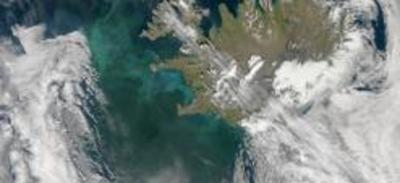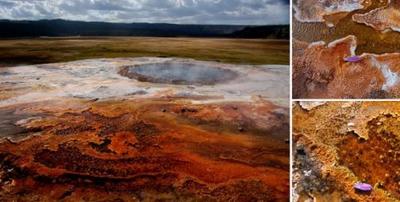Biogeochemistry & Marine Ecosystems
A significant challenge in understanding the changing earth system is to quantify and model the role of ocean ecosystems in the global carbon cycle. Researchers within PAOC are developing tools to allow marine ecosystems and biogeochemistry to be modeled within the framework of eddy-resolving models of the ocean circulation to better understand the interplay of the processes involved.
 In PAOC we try to understand, model and describe the role of ocean circulation and its variability in controlling and modulating global biogeochemical cycles. In addition we also seek to understand and describe the feedbacks between climate and biogeochemical processes. Using tracers PAOC researchers are able to extract quantitative information about the rates of communication between the surface and the deep ocean.
In PAOC we try to understand, model and describe the role of ocean circulation and its variability in controlling and modulating global biogeochemical cycles. In addition we also seek to understand and describe the feedbacks between climate and biogeochemical processes. Using tracers PAOC researchers are able to extract quantitative information about the rates of communication between the surface and the deep ocean.
Centers & Initiatives
The Climate Modeling Initiative is an open-source collaborative based at MIT which has developed a modeling infrastructure for the study of the atmosphere, ocean and climate of the Earth.
The Darwin Project is an initiative to advance the development and application of novel models of marine microbes and microbial communities.
Groups
We seek to understand the dynamical organization of the natural environment by investigating the cooperative phenomena underlying common yet poorly understood observations. Our work combines theory, field observations, and experiments to study proble...
We use models and data analysis to investigate the connections between ocean circulation, biogeochemical cycles and marine ecosystems.
Professor Ferrari's Group is interested in the dynamics of the ocean, its interactions with present and past climates, and its coupling to biogeochemistry.
The Woosley group focuses on the anthropogenic perturbation to the marine carbon cycle, including uptake of CO2 from the atmosphere and the resulting decrease in pH (ocean acidification). We work to understand the underlying physical chemistry that d...
 In PAOC we try to understand, model and describe the role of ocean circulation and its variability in controlling and modulating global biogeochemical cycles. In addition we also seek to understand and describe the feedbacks between climate and biogeochemical processes. Using tracers PAOC researchers are able to extract quantitative information about the rates of communication between the surface and the deep ocean.
In PAOC we try to understand, model and describe the role of ocean circulation and its variability in controlling and modulating global biogeochemical cycles. In addition we also seek to understand and describe the feedbacks between climate and biogeochemical processes. Using tracers PAOC researchers are able to extract quantitative information about the rates of communication between the surface and the deep ocean.


